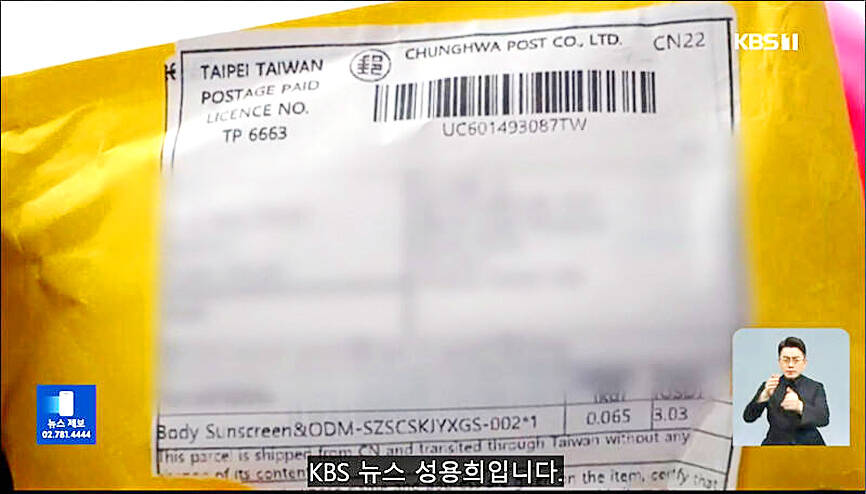A suspicious package that had been sent from Taiwan to a South Korean care home was found to have originated in China, the Taipei Mission in Korea said on Friday.
Based on information provided by Taiwan’s Customs Administration, the package was confirmed to have been sent from China and transshipped to South Korea by Taiwan’s state-run postal service Chunghwa Post Co, the mission said in a statement.
The Taipei mission said it will continue to work with South Korean authorities on the matter and share the results of the probe with the police and other agencies in the country.

Photo: Screen grab from Korean Broadcasting System
The incident was discovered after three Ulsan care home staffers who opened the package on Thursday began experiencing dizziness and difficulty breathing, and they were subsequently hospitalized for treatment.
The package has since been handed over to the South Korean Agency for Defense Development for further examination.
The package had been sent by surface mail from China, then sorted through Chunghwa Post’s freight forwarding center during a stopover in Taiwan, Taiwan’s Criminal Investigation Bureau (CIB) said.
Without entering customs, it was later transshipped directly to South Korea via air mail, the CIB said.
POLICE WARNING
In a Yonhap News Agency report yesterday, South Korean police called for vigilance against suspicious international parcels, saying that such packages could be yellow or black, and they could have “Chunghwa Post” written on them.
The sender could be Post Office Box 100561-003777, Taipei, Taiwan, the report said.
Chunghwa Post has provided information to South Korean authorities after it was informed of the matter, the Chunghwa’s deputy chief of mail business and operations Lin Li-fu (林立富) said.
Lin said the company has temporarily suspended transshipping packages destined for South Korea from freight forwarders, as the police investigation continues.
Due to China’s insufficient postal capacity, international packages from that country often go through Taiwan before being forwarded to their final destination, the company said.

POSITIVE DEVELOPMENT: Japan and the US are expected to hold in-depth discussions on Taiwan-related issues during the meeting next month, Japanese sources said The holding of a Japan-US leaders’ meeting ahead of US President Donald Trump’s visit to China is positive news for Taiwan, former Japan-Taiwan Exchange Association representative Hiroyasu Izumi said yesterday. After the Liberal Democratic Party’s landslide victory in Japan’s House of Representatives election, Japanese Prime Minister Sanae Takaichi is scheduled to visit the US next month, where she is to meet with Trump ahead of the US president’s planned visit to China from March 31 to April 2 for a meeting with Chinese President Xi Jinping (習近平). Japan and the US are expected to hold in-depth discussions on Taiwan-related issues during the

‘LIKE-MINDED PARTNER’: Tako van Popta said it would be inappropriate to delay signing the deal with Taiwan because of China, adding he would promote the issue Canadian senators have stressed Taiwan’s importance for international trade and expressed enthusiasm for ensuring the Taiwan-Canada trade cooperation framework agreement is implemented this year. Representative to Canada Harry Tseng (曾厚仁) in an interview with the Central News Agency (CNA) said he was increasingly uneasy about Ottawa’s delays in signing the agreement, especially as Ottawa has warmed toward Beijing. There are “no negotiations left. Not only [is it] initialed, we have three versions of the text ready: English, French and Mandarin,” Tseng said. “That tells you how close we are to the final signature.” Tseng said that he hoped Canadian Prime Minister Mark Carney

President William Lai (賴清德) yesterday bestowed one of Taiwan’s highest honors on Saint Vincent and the Grenadines (SVG) Ambassador Andrea Clare Bowman in recognition of her contributions to bilateral ties. “By conferring the Order of Brilliant Star with Grand Cordon on Ambassador Bowman today, I want to sincerely thank her, on behalf of the Taiwanese people, for her outstanding contribution to deepening diplomatic ties between Taiwan and SVG,” Lai said at a ceremony held at the Presidential Office in Taipei. He noted that Bowman became SVG’s first ambassador to Taiwan in 2019 and

A man walks past elementary school artworks at the Taipei Lantern Festival in Ximen District yesterday, the first day of the event. The festival is to run from 5pm to 10pm through March 15.